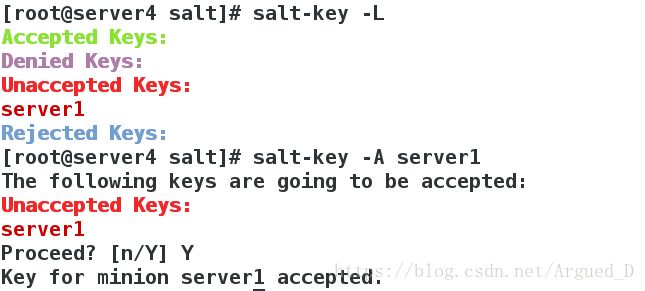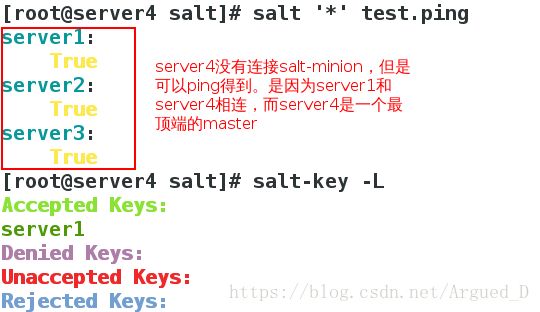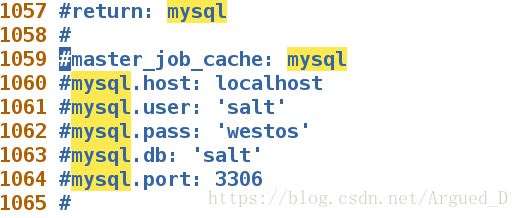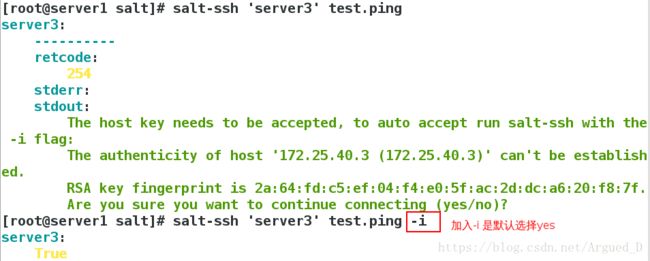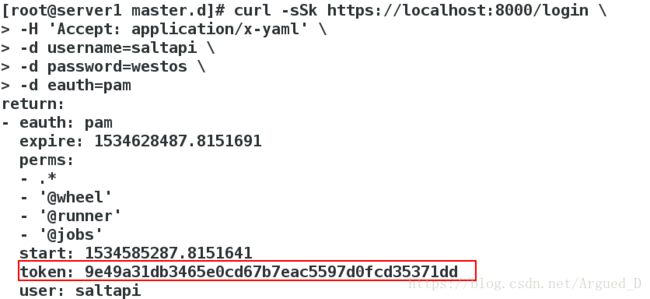自动化运维工具Saltstack扩展(salt-ssh/salt-api/salt-syndic)
salt-syndic
将server4从salt-minion中分离出来,单独做一个Topmaster
[root@server1 ~]# salt-key -L
[root@server1 ~]# salt-key -d server4[root@server4 ~]# /etc/init.d/salt-minion stop
[root@server4 ~]# chkconfig salt-minion off
[root@server4 ~]# /etc/init.d/haproxy stop
[root@server4 ~]# /etc/init.d/keepalived stop
[root@server4 ~]# yum install -y salt-master
[root@server4 ~]# cd /etc/salt/
[root@server4 salt]# vim master
857 order_masters: True
[root@server4 salt]# /etc/init.d/salt-master start
[root@server4 salt]# salt-key -L [root@server1 ~]# yum install -y salt-syndic
[root@server1 ~]# cd /etc/salt/
[root@server1 salt]# vim master
861 syndic_master: 172.25.40.4
[root@server1 salt]# /etc/init.d/salt-master restart
[root@server1 salt]# /etc/init.d/salt-syndic start【server4】将server1的钥匙传给server4
[root@server4 salt]# salt-key -L
[root@server4 salt]# salt-key -A server1测试:
[root@server4 salt]# salt '*' test.ping
[root@server4 salt]# salt-key -Lsalt-ssh
[root@server3 ~]# /etc/init.d/salt-minion stop[root@server1 salt]# yum install -y salt-ssh
[root@server1 salt]# vim /etc/salt/roster
server3:
host: 172.25.40.3
user: root
passwd: westos
[root@server1 salt]# vim master #注释所有关于mysql测试:
[root@server1 salt]# salt-ssh 'server3' test.ping
[root@server1 salt]# salt-ssh 'server3' test.ping -i[root@server1 salt]# salt-ssh 'server3' my_disk.dfsalt-api
[root@server3 ~]# /etc/init.d/salt-minion start[root@server1 salt]# yum install -y salt-api
[root@server1 salt]# cd /etc/pki/
[root@server1 pki]# cd tls/
[root@server1 tls]# cd private/
[root@server1 private]# openssl genrsa 1024 > localhost.key[root@server1 private]# cd ..
[root@server1 tls]# cd certs/
[root@server1 certs]# make testcert[root@server1 certs]# cd /etc/salt/
[root@server1 salt]# cd master.d/
[root@server1 master.d]# vim api.conf
rest_cherrypy:
port: 8000
ssl_crt: /etc/pki/tls/certs/localhost.crt
ssl_key: /etc/pki/tls/private/localhost.key
[root@server1 master.d]# vim auth.conf
external_auth:
pam:
saltapi:
- '.*'
- '@wheel'
- '@runner'
- '@jobs'
[root@server1 master.d]# useradd saltapi #建立用户
[root@server1 master.d]# passwd saltapi #设置密码
[root@server1 master.d]# /etc/init.d/salt-master stop
[root@server1 master.d]# /etc/init.d/salt-master start
[root@server1 master.d]# /etc/init.d/salt-api start
[root@server1 master.d]# netstat -antlp |grep :8000获取Token
[root@server1 master.d]# curl -sSk https://localhost:8000/login \
> -H 'Accept: application/x-yaml' \
> -d username=saltapi \
> -d password=westos \
> -d eauth=pam[root@server1 master.d]# curl -sSk https://localhost:8000 \
> -H 'Accept: application/x-yaml' \
> -H 'X-Auth-Token: 9e49a31db3465e0cd67b7eac5597d0fcd35371dd' \
> -d client=local \
> -d tgt='*' \
> -d fun=test.ping[root@server1 ~]# vim salt-api.py
# -*- coding: utf-8 -*-
import urllib2,urllib
import time
try:
import json
except ImportError:
import simplejson as json
class SaltAPI(object):
__token_id = ''
def __init__(self,url,username,password):
self.__url = url.rstrip('/')
self.__user = username
self.__password = password
def token_id(self):
''' user login and get token id '''
params = {'eauth': 'pam', 'username': self.__user, 'password': self.__password}
encode = urllib.urlencode(params)
obj = urllib.unquote(encode)
content = self.postRequest(obj,prefix='/login')
try:
self.__token_id = content['return'][0]['token']
except KeyError:
raise KeyError
def postRequest(self,obj,prefix='/'):
url = self.__url + prefix
headers = {'X-Auth-Token' : self.__token_id}
req = urllib2.Request(url, obj, headers)
opener = urllib2.urlopen(req)
content = json.loads(opener.read())
return content
def list_all_key(self):
params = {'client': 'wheel', 'fun': 'key.list_all'}
obj = urllib.urlencode(params)
self.token_id()
content = self.postRequest(obj)
minions = content['return'][0]['data']['return']['minions']
minions_pre = content['return'][0]['data']['return']['minions_pre']
return minions,minions_pre
def delete_key(self,node_name):
params = {'client': 'wheel', 'fun': 'key.delete', 'match': node_name}
obj = urllib.urlencode(params)
self.token_id()
content = self.postRequest(obj)
ret = content['return'][0]['data']['success']
return ret
def accept_key(self,node_name):
params = {'client': 'wheel', 'fun': 'key.accept', 'match': node_name}
obj = urllib.urlencode(params)
self.token_id()
content = self.postRequest(obj)
ret = content['return'][0]['data']['success']
return ret
def remote_noarg_execution(self,tgt,fun):
''' Execute commands without parameters '''
params = {'client': 'local', 'tgt': tgt, 'fun': fun}
obj = urllib.urlencode(params)
self.token_id()
content = self.postRequest(obj)
ret = content['return'][0][tgt]
return ret
def remote_execution(self,tgt,fun,arg):
''' Command execution with parameters '''
params = {'client': 'local', 'tgt': tgt, 'fun': fun, 'arg': arg}
obj = urllib.urlencode(params)
self.token_id()
content = self.postRequest(obj)
ret = content['return'][0][tgt]
return ret
def target_remote_execution(self,tgt,fun,arg):
''' Use targeting for remote execution '''
params = {'client': 'local', 'tgt': tgt, 'fun': fun, 'arg': arg, 'expr_form': 'nodegroup'}
obj = urllib.urlencode(params)
self.token_id()
content = self.postRequest(obj)
jid = content['return'][0]['jid']
return jid
def deploy(self,tgt,arg):
''' Module deployment '''
params = {'client': 'local', 'tgt': tgt, 'fun': 'state.sls', 'arg': arg}
obj = urllib.urlencode(params)
self.token_id()
content = self.postRequest(obj)
return content
def async_deploy(self,tgt,arg):
''' Asynchronously send a command to connected minions '''
params = {'client': 'local_async', 'tgt': tgt, 'fun': 'state.sls', 'arg': arg}
obj = urllib.urlencode(params)
self.token_id()
content = self.postRequest(obj)
jid = content['return'][0]['jid']
return jid
def target_deploy(self,tgt,arg):
''' Based on the node group forms deployment '''
params = {'client': 'local_async', 'tgt': tgt, 'fun': 'state.sls', 'arg': arg, 'expr_form': 'nodegroup'}
obj = urllib.urlencode(params)
self.token_id()
content = self.postRequest(obj)
jid = content['return'][0]['jid']
return jid
def main():
sapi = SaltAPI(url='https://172.25.40.1:8000',username='saltapi',password='westos')
#sapi.token_id()
#print sapi.list_all_key()
#sapi.delete_key('test-01')
#sapi.accept_key('test-01')
sapi.deploy('server3','nginx.service')
#print sapi.remote_noarg_execution('test-01','grains.items')
if __name__ == '__main__':
main()测试:
将【server3】上的nginx关闭
[root@server3 ~]# /etc/init.d/nginx stop执行python脚本
[root@server1 ~]# python salt-api.py[root@server3 ~]# ps ax #此时nginx已经开启

